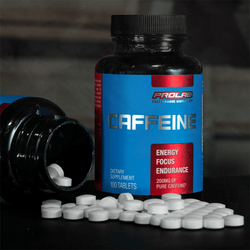Caffeine | Prolab Nutrition
Posted by Prolab Nutrition on 19th Sep 2022
Caffeine is a natural stimulant most found in tea, coffee, and cacao plants. It works by stimulating the brain and central nervous system, helping you stay alert and prevent the onset of tiredness. Caffeine is also a diuretic, meaning it helps to expel water from your body via urination. Historians track the first brewed tea as far back as 2737 B.C. Coffee was reportedly discovered many years later by an Ethiopian shepherd who noticed the extra energy it gave his goats. Caffeinated soft drinks hit the market in the late 1800s and energy drinks soon followed. Nowadays, 80% of the world’s population consumes a caffeinated product each day, and this number goes up to 90% for adults in North America. Caffeine is also found in some unlikely places, such as chocolate, certain types of pain relievers, and even some supplements.
Benefits Of Caffeine
Caffeine is a central nervous system stimulant, and can be found in coffee, tea, supplement, soda, energy drinks, and chocolate. Caffeine works by blocking the neurotransmitter adenosine from binding to its receptors. This prevents adenosine from performing its normal function of making us feel tired. Caffeine also increases the release of other neurotransmitters like dopamine and norepinephrine, which leads to increased alertness. Caffeine has been shown to improve cognitive performance in tasks like reaction time, memory, and vigilance. In moderate doses (40-200 mg), caffeine can be beneficial for fatigue, weight, depression, and suicide risk. However, it is important to note that caffeine is a psychoactive drug and can cause side effects like anxiety, jitters, and insomnia in some people. It is also addictive, so it is important to consume it in moderation.
How Caffeine Works On The Body
Caffeine is a stimulant that occurs naturally in some plants. Once it's consumed, caffeine is quickly absorbed from the gut into the bloodstream. From there, it travels to the liver where it's broken down into compounds that can affect various organs. Caffeine's main effect is on the brain. It helps you stay awake by connecting to adenosine receptors in the brain without activating them. This blocks the effects of adenosine, leading to reduced tiredness. Caffeine may also increase blood adrenaline levels and increase brain activity! Prolab Nutrition has 200mg caffeine tablets for convenient use!
Improves Brain Function & Mood
Caffeine is a psychoactive substance that has a number of benefits and drawbacks. Caffeine has the ability to block the brain-signaling molecule adenosine. This causes a relative increase in other signaling molecules, such as dopamine and norepinephrine. This change in brain messaging is thought to benefit your mood and brain function. Caffeine is also a central nervous system stimulant, which can help you feel more awake and alert. Caffeine is found in coffee, tea, energy drinks, chocolate, and some medications. Caffeine is also available as a supplement. If you're pregnant or breastfeeding, you should limit your caffeine intake to 200 mg per day. Caffeine is a widely consumed substance that has a number of potential benefits.
Boost Metabolism & Lose Weight
Caffeine is a central nervous system stimulant. This means that it can increase metabolism and fat burning. Some studies have shown that caffeine can increase metabolism by up to 11% and fat burning by up to 13%. Practically speaking, this means that consuming 300 mg of caffeine per day may allow you to burn an extra 79 calories daily. This amount may seem small, but it’s similar to the calorie excess responsible for the average yearly weight gain of 2.2 pounds (1 kg) in Americans. Therefore, if you are looking to lose weight, you may want to consider adding daily caffeine intake.
Athletic Ability & Performance
For athletes and fitness enthusiasts, caffeine is often used as a performance-enhancing supplement. This is because caffeine has been shown to improve endurance and muscle contractions. In fact, research indicates that doses of 1.4–2.3 mg per pound (3–5 mg per kg) of body weight may be sufficient to enhance athletic performance. When consumed before exercise, caffeine can help the body use fat as fuel, which can delay the onset of muscle exhaustion. Caffeine may also increase tolerance to fatigue, making it easier to push through a tough workout.


